The power of belonging: dissecting The Center for Talent Innovation’s latest research
Intuitively we know a sense of belonging matters. But what does it really mean to feel like you belong – and what impact does it have in the workplace?
As this report by think tank The Center for Talent Innovation points out, “belonging” is a popular concept yet it’s not that easy to define precisely. A definition, though, is important as it enables the creation of communities that people feel part of, both in and outside of work. The report “The power of belonging: What it is and why it matters in today’s workplace” sets out to provide a more precise understanding of what belonging is, and then give some insights into what that sense of belonging looks like in today’s workplace.
Defining a sense of belonging
The Center for Talent Innovation’s report suggests there are 4 key elements involved in a sense of belonging. Firstly, being seen: not necessarily physically but rather being recognized for the unique contributions that are being made. Secondly, having a sense of connection with peers, managers and senior leaders thanks to positive and authentic interactions. Thirdly, feeling well-supported both in daily work and in life in general. Finally, feeling proud of what the organization stands for, with a sense of personal alignment with its values and purpose.
A ten point scale was devised around these four elements, which was then used to calculate the “belonging scores” of all the research participants. The research was carried out this year (just as the pandemic was starting to unfold) using a mix of in-person focus groups, web-based focus groups and one-to-one interviews to gauge the views of US white collar employees aged between 21 and 65.
What insights do the results give us?
Are organizations doing enough to foster a genuine sense of togetherness? The initial picture’s actually quite encouraging. Based on total overall belonging scores, most employees do seem to have a reasonably good sense of belonging: the median score comes out at 7.40 and half of all respondents come out between 6.25 and 8.54.
As might be expected, the higher the belonging score, the more likely it is to correlate with positive career indicators like engagement, loyalty and intention to stay with the company. Those in the highest quartile were likely to feel very engaged – 97% compared to 54% in the lowest quartile. Loyalty to the organization rose as the belonging score increased, ranging from 35% in the bottom quartile to 93% of professionals in the top quartile. Those in the bottom quartile were far less likely to recommend their company as a good place to work: 17% compared to 71%.
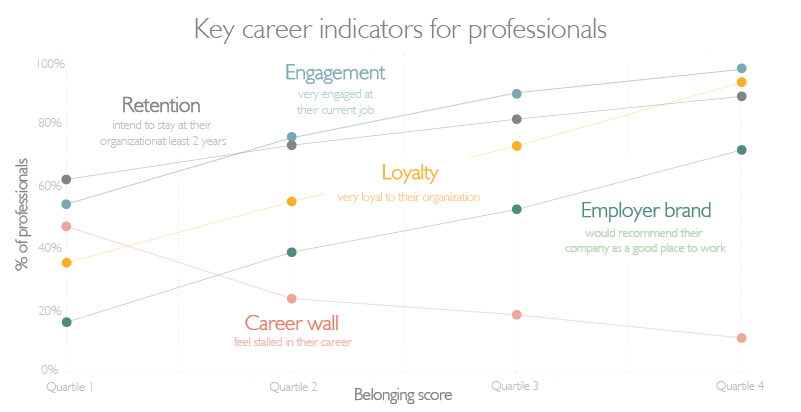
Diversity and inclusion
What does the report tell us about the differences from the perspective of diversity and inclusion? Perhaps unsurprisingly, it’s clear there are some significant differences in terms of ethnicity. White men are most likely to feel a sense of belonging, then white women. At the bottom end of the belonging continuum are black women and Asian women.
The report highlights the fact that almost one in three black employees and one in four Asian workers feel out of place because of their ethnicity. The need to belong has formed a key part of the ongoing #BlackLivesMatter narrative and in terms of the workplace this once again reinforces its importance as an issue employers and business leaders must be thinking about carefully.
Older generations are more comfortable with feeling that they belong. The ‘baby boomer’ generation sits slightly ahead of Generation X and millennials in its belonging scores, perhaps due to them having had more time to work their way into senior roles, or simply even due to feeling more settled in an organization they’ve worked in for a long time. Other analysis of the data shows veterans tending to feel a greater sense of belonging, then LGBTQ professionals, then people born outside the US.
‘Unexplored identities’
The report also takes a look at what it calls ‘unexplored identities’: in other words, the markers which might be not be regarded as being amongst the more immediately obvious demographic groups. Parents are more likely to feel a sense of belonging than non-parents. Perhaps this is thanks to a greater sense of empathy and shared experience with colleagues who are parents too. Extroverts show a higher sense of belonging than introverts, maybe because they find it easier to build a sense of connection with others face to face. Where there’s convergence of political viewpoints, there’s a greater sense of belonging too.
As you’d also probably anticipate, C-Suite and executive members show a higher sense of belonging, then remote workers and then contractors. With the gig economy continuing to grow, companies might want to take note and think about steps they can take to help gig workers feel more like part of the team.
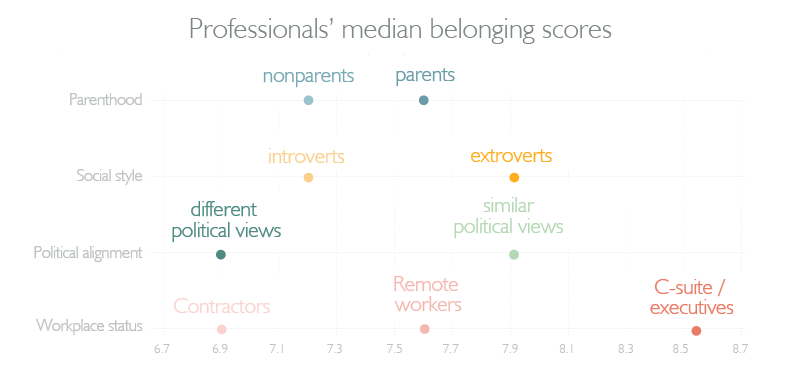
How can companies build a greater sense of belonging?
So what can companies do to increase a sense of belonging? The report offers inspiration with its insights into what employees with top quartile belonging scores identify as the 5 key things they get from each of the following four stakeholders.
Organizations that lay the foundations
Above all, it’s role modelling and a sense of commonality that contribute towards feeling a sense of belonging – making it more important than ever that every employee feels they have senior leaders they can trust and identify with.
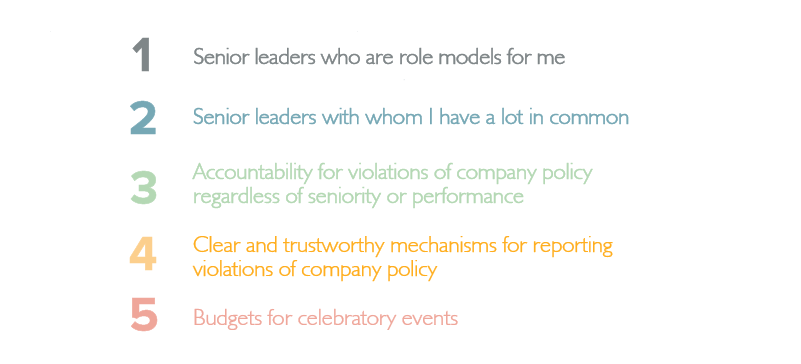
Senior leaders set the tone
Employees who feel like they belong have senior leaders who act authentically, and bring the values to life. There’s a sense of connection and an inclusive approach towards all employees.
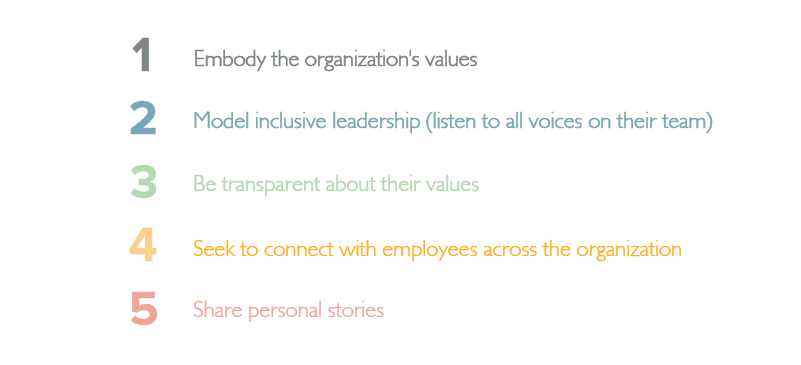
Managers carry the culture
To make employees feel that they belong, they need to know their efforts are recognized and acknowledged. They need to be aware that managers see what they’re doing, are appreciative of it and are responsive to it through feedback.
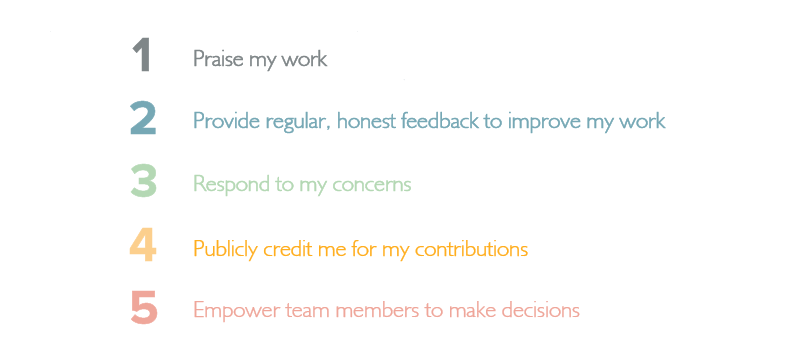
Peers drive belonging
There’s some replication of the points above but this time, the sense of belonging comes from recognition and feedback from peers. The importance of respect for outside commitments is clear too; it seems that understanding from colleagues goes a long way.
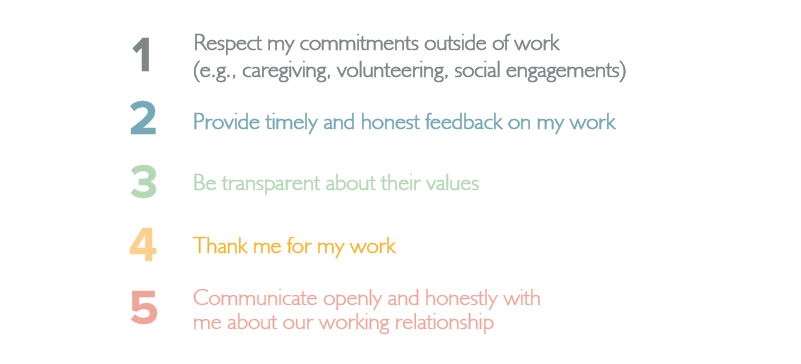
What will the future hold?
Of course, there’s now another dynamic that is inevitably going to play a part; the longer term impact of the coronavirus pandemic on a sense of belonging in workplace.
On one hand, it will create new challenges for companies. With fewer people physically present in a shared workplace – something that may start to become the new normal for many employees – it’s imperative companies are thinking about what they can do to build and maintain a sense of belonging and encourage employees to live values, demonstrate respect and support and show appreciation of one another remotely.
Yet as well as the obvious challenges it presents, it also offers new possibilities to think differently. For example, the significance of the nature of office space has diminished in some instances. The physical symbols of workplace hierarchy and other cultural markers have altered and in many ways that’s started to level the playing field. The issue of presenteeism has shifted. People who might once have felt an outsider as they struggled to fit in with specific core office hours may suddenly have felt that pressure lift. Instead, they’ve experienced a greater acceptance of the need for adaptability and flexibility.
Read more: Can you scientifically measure company culture?
As a result of this sudden enforced transformation employees are finding different ways to talk, share, collaborate and support each other. For companies that want to identify and adopt new ways to grow that vital sense of employee belonging, they might now find the current situation could present an opportunity to make some significant progress.


 Birthday recognition: The employer ROI
Birthday recognition: The employer ROI
 Values in action: How Questrade is building a culture of recognition and belonging
Values in action: How Questrade is building a culture of recognition and belonging
 30 ideas to help a new starter in their first week
30 ideas to help a new starter in their first week